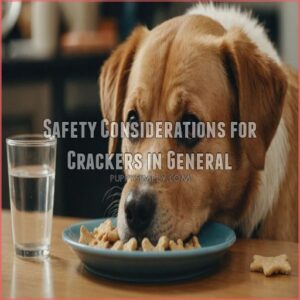This site is supported by our readers. We may earn a commission, at no cost to you, if you purchase through links.
 Sure, you can give your dog animal crackers, but let’s not make it a habit.
Sure, you can give your dog animal crackers, but let’s not make it a habit.
These crunchy little treats pack sugar and can lead to weight gain or dental issues.
Plus, some dogs might have a tummy upset due to wheat and dairy.
Definitely steer clear of chocolate and frosted varieties; they’re a no-go.
Plain ones are a safer bet, but always in moderation.
Remember, dog’s health trumps snack time fun!
Curious about safe snacks for your canine buddy?
There are amazing options out there that won’t turn your dog into a snack monster.
Table Of Contents
- Key Takeaways
- What Are Animal Crackers
- Can Dogs Eat Animal Crackers
- Types of Animal Crackers Safe for Dogs
- Types of Animal Crackers to Avoid Giving Dogs
- Risks of Overfeeding Animal Crackers to Dogs
- Safe Alternatives to Animal Crackers for Dogs
- Safety Considerations for Crackers in General
- Tips for Feeding Crackers to Dogs Safely
- Consult a Veterinarian for Personalized Advice
- Frequently Asked Questions (FAQs)
- Are animal Crackers bad for dogs?
- Can dogs eat wafer crackers?
- Can dogs eat cheese crackers?
- Can dogs eat butter crackers?
- What kind of animal crackers can dogs eat?
- Will animal crackers harm my dog?
- Are animal crackers dog-safe?
- How can I identify dog food allergies?
- What are the symptoms of cracker allergies?
- Can animal crackers affect a dogs weight?
- Are high-calorie treats harmful to dogs?
- How often can dogs have treats?
- Conclusion
Key Takeaways
- You can give your dog plain animal crackers in moderation, but they’re high in sugar and calories, so they’re not the healthiest option.
- Avoid chocolate, frosted, or xylitol-containing animal crackers as they can be harmful to your dog’s health.
- Dogs can also experience negative reactions to high-sodium snacks like Cheez-Its, which can lead to health issues such as pancreatitis due to their high sodium content. There are safer alternatives like dog-friendly treats or fresh fruits and vegetables that provide better nutrition.
- Always consult your vet for personalized advice, especially if your dog has allergies or dietary restrictions.
What Are Animal Crackers
You’ve likely seen these whimsical, animal-shaped cookies in your pantry or at the store.
Animal crackers are sweet, crunchy snacks made from flour, sugar, and other ingredients, often shaped like various creatures from lions to elephants.
History and Origins of Animal Crackers
Dating back to the 1800s, animal crackers have delighted snackers of all ages.
Early animal cracker makers crafted these treats into iconic animal shapes, sparking joy and imagination.
Their popularity soared, evolving from simple biscuits to cultural icons.
Over time, packaging transformed from basic tins to the circus-wagon boxes we see today.
These whimsical snacks have left their pawprint on history, enthralling both humans and curious pups alike.
Ingredients in Animal Crackers
Now that you know where animal crackers came from, let’s peek inside the cookie jar.
These little zoo-inspired treats pack quite a punch with their ingredient list.
You’ll typically find wheat flour as the base, along with sugar for sweetness.
Milk solids give them that creamy taste, while artificial colors make them visually appealing.
Don’t forget preservatives – they’re the reason these snacks can hang out in your pantry for so long.
Nutritional Value of Animal Crackers
You might be surprised to learn that animal crackers aren’t just fun shapes.
They pack a nutritional punch, though they’re not exactly a superfood.
Let’s break down what these crunchy critters bring to the table:
- Calcium content: Helps build strong bones
- Fiber benefits: Thanks to wheat flour, aiding digestion
- Protein source: A small boost for muscle maintenance
Remember, while they offer some perks, they’re still treats.
Moderation is key when considering animal crackers for your furry friend’s dog nutrition plan.
Can Dogs Eat Animal Crackers
You might be tempted to share your animal crackers with your furry friend, but it’s important to know the facts first.
While dogs can technically eat animal crackers in small amounts, they’re not a healthy or recommended treat due to their high sugar content and potential risks.
Benefits of Animal Crackers for Dogs
Let’s talk about the bright side of animal crackers for your furry friend.
While they’re not a superfood, these treats can offer some perks.
If you’re feeling adventurous, you can even try making your own animal crackers at home using a simple animal cracker recipe.
Here’s a quick breakdown:
| Nutrient | Benefit | Impact |
|---|---|---|
| Calcium | Bone health | Supports strong bones |
| Protein | Muscle maintenance | Aids recovery |
| Vitamin B | Brain function | Boosts cognitive skills |
Remember, moderation is key.
These snacks shouldn’t replace your pup’s regular pet food.
They’re just a fun, occasional treat that can add a little variety to your dog’s diet.
Risks Associated With Animal Crackers for Dogs
While animal crackers might seem harmless, they can actually dish out some risks for your furry friend. Before you toss Fido a treat, consider these potential hazards: Animal crackers aren’t only bad for your dog’s teeth, but their high sugar content can also lead to health concerns linked to obesity. Sugar content: Can lead to weight gain and dental issues Digestive upset: Wheat and dairy may not agree with your pup’s tummy Allergies: Some dogs are sensitive to ingredients like wheat or milk Choking hazard: Small, hard pieces can get stuck in your dog’s throat
Types of Animal Crackers Safe for Dogs
You’re probably wondering which animal crackers are safe for your furry friend.
While it’s best to stick to dog-specific treats, plain animal crackers, organic varieties, and Barnum’s animal crackers can be given in small quantities as an occasional treat.
Plain Animal Crackers
For treating your furry friend, plain animal crackers are the safest bet.
These simple snacks have fewer calories and less sugar than their fancy cousins.
They’re like the vanilla ice cream of the dog treat world – basic but reliable.
Just remember, moderation is key.
Too many crackers can lead to weight gain or tummy troubles.
Stick to small portions as an occasional treat, and your pup will be wagging their tail in no time.
Organic Animal Crackers
Organic animal crackers might seem like a healthier choice for your furry friend, but don’t be fooled by the label.
While they may contain better ingredients, they’re still high in calories and sugar.
You’re better off sticking to treats made specifically for dogs.
If you’re set on sharing, break off a tiny piece as an occasional reward during training sessions.
Remember, moderation is key to keeping your pup happy and healthy.
Barnum’s Animal Crackers
Let’s talk about Barnum’s Animal Crackers, the iconic snack with a circus-themed box.
They’re safe for dogs in small amounts, but here’s the catch: they contain high fructose corn syrup.
Moderation is key.
Barnum’s history dates back to 1902, but your pup doesn’t need a history lesson.
Instead, consider healthier alternatives like plain crackers or fish oil treats.
Remember, Barnum’s sugar content is higher than plain varieties, so keep portions tiny.
Types of Animal Crackers to Avoid Giving Dogs
While some animal crackers are safe for dogs in moderation, certain types can be harmful to your furry friend.
You’ll want to steer clear of chocolate animal crackers, frosted varieties, and any containing xylitol, as these ingredients can pose serious health risks to dogs.
Chocolate Animal Crackers
While plain animal crackers might be okay in small amounts, chocolate animal crackers are a big no-no for your furry friend.
Chocolate contains theobromine, which is toxic to dogs.
Even a small amount can make your pup sick, causing symptoms like vomiting, diarrhea, and in severe cases, heart problems or seizures.
It’s best to keep these treats out of paw’s reach and opt for dog-safe alternatives instead.
Frosted Animal Crackers
Frosted animal crackers are a no-go for your furry friend.
These sugary treats pack a double whammy of health risks.
The frosting’s high sugar content can lead to weight gain and dental issues.
Plus, the extra ingredients in the frosting might upset your dog’s tummy.
Stick to plain, unfrosted options if you must share.
Better yet, grab some dog-specific treats that’ll keep tails wagging without the worry.
Animal Crackers With Xylitol
Beware of animal crackers with xylitol!
This sugar substitute is a silent killer for dogs.
Even a small amount can cause rapid insulin release, leading to dangerous blood sugar drops.
Symptoms of xylitol poisoning include vomiting, loss of coordination, and seizures.
It’s not worth the risk.
Stick to dog-safe treats or plain, xylitol-free animal crackers.
Your furry friend’s health is more important than a sweet snack.
Risks of Overfeeding Animal Crackers to Dogs
You might think a few extra animal crackers won’t hurt your furry friend, but overfeeding can lead to serious health issues.
Excess consumption of these treats can cause weight gain, digestive problems, and even pose choking hazards for your dog.
Weight Gain and Obesity
Overfeeding your furry friend with animal crackers can lead to a weighty problem.
These treats pack a caloric punch, and too many can tip the scales in the direction of obesity.
Keep an eye on your pup’s waistline by practicing portion control, especially with low-calorie treats like plain Cheerios that should make up no more than 10% of a dog’s daily calories, and balancing treats with regular exercise.
Remember, a healthy dog is a happy dog.
Swap out those crackers for lower-calorie options to keep your canine companion fit and fabulous.
Digestive Issues and Allergies
Many dogs have delicate tummies, and animal crackers can spell trouble.
These treats often contain common allergens like wheat, which can trigger grain sensitivities in some pups.
You might notice digestive upset or stomach irritation if your furry friend has food intolerances.
It’s like giving a lactose-intolerant person a milkshake – not a pretty sight!
Keep an eye out for any unusual reactions, and always introduce new treats gradually.
Choking Hazards and Intestinal Blockage
Feeding your dog too many animal crackers isn’t just a recipe for tummy troubles.
These seemingly innocent treats can pose serious risks.
While your pup might gobble them up like they’re going out of style, it’s important to keep an eye on their chewing habits.
Here’s why:
- Choking hazard: Large pieces can get stuck in your dog’s throat
- Intestinal blockage: Swallowing whole crackers may lead to dangerous obstructions
- Dental damage: Hard crackers can chip or crack teeth
Regarding treat size and dog food safety, less is more.
Consult your vet for safe alternatives that’ll keep your furry friend’s tail wagging.
Safe Alternatives to Animal Crackers for Dogs
You don’t have to give up on treating your furry friend just because animal crackers aren’t ideal.
There are plenty of safe, healthy alternatives that’ll keep your dog’s tail wagging, from homemade treats to dog-friendly fruits and veggies.
Homemade Dog Treats
If you’re looking for a tasty reward and want to avoid unhealthy snacks like Cheerios for dogs, Why not whip up some DIY dog treats that are both fun and safe?
You can pick healthy ingredients like oats, peanut butter, or pumpkin, ensuring allergy-friendly options that won’t upset your pup’s tummy.
Check out recipes to try, and remember treat safety is key.
Your furry friend will love the homemade touch, wagging that tail in delight!
Commercial Dog Treats
Opting for commercial dog treats over animal crackers can provide better nutrition for your pup.
These treats are specifically crafted for dogs, focusing on ideal ingredients and quality, such as dog-specific probiotics like Proviable or Fortiflora options.
Brands vary in cost, but investing in your pet’s health is a wise choice.
Treats should be low-calorie and free from unhealthy additives, a safe alternative guaranteeing canine satisfaction.
Fresh Fruits and Vegetables
Think about offering your dog fresh fruits and veggies instead of sugary animal crackers.
They’re healthier, safer, and make great homemade treats.
Dogs can munch on various fruits and veggies packed with nutrients:
- Dog-friendly fruits: Apples (without seeds)
- Veggie safety: Carrots (raw or cooked)
- Fruit snacks: Blueberries (in moderation)
- Homemade treats: Bananas (sliced)
Safety Considerations for Crackers in General
When you’re considering giving crackers to your dog, it’s important to keep an eye on the sodium and any added spices.
Many crackers contain ingredients that aren’t dog-friendly, leading to potential digestive issues or allergies.
Sodium Content in Crackers
So, you’ve found healthy dog treats; great!
But what about those human crackers?
Many crackers are loaded with sodium.
If you’re considering alternatives, you can explore dog treats crackers options online, such as special dog crackers.
Too much sodium throws off your dog’s electrolyte balance, increasing dehydration risk.
High sodium intake can even strain their heart and kidneys.
Choose low-sodium options sparingly; your pup’s health depends on it!
Remember, moderation is key for a happy, healthy pet.
Additives and Spices in Crackers
Keep an eye on additives and spices in crackers for your furry friend’s safety.
Harmful ingredients like onion and garlic can cause spice toxicity, leading to onion and garlic dangers.
Just like saltine crackers, which have high sodium content risks, other seemingly harmless snacks can pose a threat to your dog’s health.
Here’s a quick list:
- Avoid harmful additives.
- Steer clear of onion and garlic.
- Opt for safe spices.
- Check labels for hidden dangers.
Stay vigilant!
Allergies and Digestive Sensitivities to Crackers
Crackers can be a wolf in sheep’s clothing for dogs with wheat allergies or grain sensitivities.
These common allergens might lead to digestive upset, turning your furry friend’s snack time into a tummy ache.
Always check cracker ingredients before sharing.
Slowly introduce them to spot any adverse reactions.
Remember, even a little treat can cause a big headache.
Tips for Feeding Crackers to Dogs Safely
When you’re offering animal crackers to your furry friend, it’s important to keep a few things in mind.
Make sure the crackers are low in sodium and free from harmful ingredients to guarantee your dog’s safety.
Moderation is Key
Feeding your dog crackers? Let’s keep it light.
Picture an old-fashioned balance scale when you treat your furry friend.
Tossing the odd animal cracker their way isn’t the worst habit, but moderation truly is key.
Too many can upset a dog’s diet and calorie control.
Think of these snacks as an occasional delight rather than a main course.
Choose Low-Sodium Crackers
Sodium overload isn’t your pup’s best friend.
Opt for low-sodium crackers to keep your dog happily wagging.
Why? High-sodium content can lead to dehydration and other health woes.
Consider these benefits:
- Dog Health: Maintains balanced electrolyte levels.
- Sodium Alternatives: Choose healthier snacks.
- Cracker Brands: Look for labeled options – your dog will thank you!
Avoid Crackers With Harmful Ingredients
While checking sodium levels, also scan those ingredient lists.
Onions, garlic, xylitol, and artificial sweeteners are sneaky hazards hiding in some crackers.
They can cause serious harm to your furry friend.
Consider opting for healthy dog treats instead that are made with wholesome ingredients, such as the ones found in best dog treats.
Preservatives may sidestep digestion and taste like cardboard too!
Stick with plain crackers minus the surprise attacks, and your pup’s tail will keep wagging.
Balanced choices, happy dogs!
Consult a Veterinarian for Personalized Advice
Every dog’s dietary needs are unique, so don’t hesitate to chat with your vet about whether animal crackers are a good fit for your furry friend; they can offer personalized advice and make sure your dog stays happy and healthy.
They’ll consider your dog’s breed, age, and any health conditions to create a safe and delicious treat plan.
Importance of Consultation
Feeling a tad confused about dog snacks? You’re not alone!
Consulting a veterinarian helps guarantee your furry friend’s treats suit their needs.
A vet can provide personalized advice on dog allergies, treat frequency, and dietary needs, crafting a customized plan for your pet.
Think of it as a snack GPS for your pup, keeping them happy and healthy!
Factors to Consider for Dog Treats
Dog treats need careful thought.
Check ingredients like allergies, and how often you give them.
Consider your dog’s size and age, since pups and seniors have different needs.
Remember, it’s not a buffet! Too many treats can lead to weight gain.
Consulting your vet is wise—they know your furry friend’s health quirks.
Smart treat choices make tails wag!
Customized Diet and Treat Plans
Considering dog food allergies and treat frequency matters.
It’s wise to consult your vet for recommendations.
They can help tailor homemade treats, such as a simple doguit recipe, using a dog biscuit recipe.
They can help guarantee dog weight management.
Think of it as crafting the perfect menu for your furry friend.
With expert guidance, you can make every treat count without compromising health, striking a balance between fun and nutrition.
Frequently Asked Questions (FAQs)
Are animal Crackers bad for dogs?
They’re not ideal!
Animal crackers are loaded with sugar and salt, which aren’t great for your pup.
A tiny bit won’t kill them, but stick to dog-friendly treats for their health.
Think of it as a rare, special occasion snack.
Can dogs eat wafer crackers?
Think of wafer crackers as a slender ally or foe.
Dogs can nibble on them occasionally, but they pack salt and fat like tiny sneaky snacks.
Opt for plain ones, and keep servings minimal to avoid trouble.
Can dogs eat cheese crackers?
Cheese crackers aren’t the best treat for your dog.
They often contain salt, additives, and unhealthy fats.
Instead, opt for dog-friendly snacks like carrots or apple slices.
Always check with your vet for personalized advice.
Can dogs eat butter crackers?
Butter crackers aren’t great for dogs due to high fats, salt, and potential additives.
While they might nibble without harm, consider healthier alternatives.
Opt for dog treats, fresh veggies, or fruits instead, keeping their diet balanced.
What kind of animal crackers can dogs eat?
You can safely give your dog plain animal crackers in moderation.
Avoid chocolate, frosted, or any flavored varieties since they can be harmful.
Stick with plain ones for a fun, occasional snack without risking health issues.
Will animal crackers harm my dog?
Feeding animal crackers to your dog won’t immediately harm them, but they’re not the best choice.
High sugar and calorie content can lead to weight gain and digestive issues.
Stick to healthier, dog-friendly treats for peace of mind.
Are animal crackers dog-safe?
Think of animal crackers as a fun treat for you, but not your dog.
They pack too much sugar and calories, which aren’t healthy.
Occasionally, plain ones might be okay, but moderation is key for your pup’s health.
How can I identify dog food allergies?
Watch for symptoms like itching, vomiting, or diarrhea after introducing new foods. If you see these, eliminate suspects and consult your vet. They’ll help pinpoint the culprit.
What are the symptoms of cracker allergies?
Cracker allergies can cause itching, swelling, sneezing, and stomach troubles.
Your dog might seem uncomfortable, scratch a lot, or have diarrhea.
If these symptoms pop up after crackers, consult your vet for a proper diagnosis.
Can animal crackers affect a dogs weight?
Feeding your dog animal crackers can lead to weight gain.
These treats are high in sugar and calories, lacking the nutrients your dog needs.
Stick to healthier options like dog-specific treats or fresh fruits and veggies.
Are high-calorie treats harmful to dogs?
Ever wondered if those tempting treats could weigh down your dog?
High-calorie treats can lead to obesity and health issues.
Just like us, dogs thrive on balanced diets.
Keep their snacks light and nutritious!
How often can dogs have treats?
Your furry friend loves treats, but moderation is key!
Aim for just 10% of their daily calories from treats.
This keeps them happy and healthy without adding unwanted pounds.
Consult your vet for personalized advice.
Conclusion
When you investigate the question, "can dogs eat animal crackers," you find there’s more to think about than a simple yes or no.
While plain animal crackers might be safe in moderation, the risks, such as weight gain and allergies, can outweigh the benefits.
Avoid chocolate or frosted varieties, and remember, there are plenty of healthier snack options designed for dogs.
Keep your furry friend’s health a priority and choose treats that enhance their well-being.
















